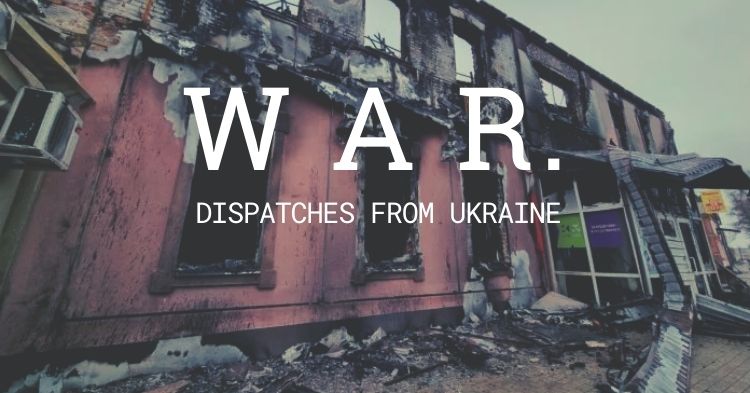On 24 February 2022, two powerful columns of the Russian army broke into Sumy Oblast. One was intended to move towards Kyiv and join other Russian units, which were preparing to seize Chernihiv and block Kyiv from the left bank of the Dnipro River. It was planned that the second column would blockade Kharkiv.
Fast forward a few months and it is clear that the Russians failed to achieve both tasks. The columns were destroyed by Ukrainian soldiers, leaving just metal scraps scattered across the battlefield. The Territorial Defense Forces deployed in Sumy Oblast played a major role in their destruction. They successfully neutralized hundreds of Russian armored vehicles while in the process also killing and capturing a lot of invaders. The whole of Ukraine sincerely admires the heroic acts of warriors from Sumy Oblast.
Still, it is hard to ignore the true nature of the Russian World, which the invaders shamelessly managed to demonstrate to the fullest extent: mass cases of torture, rape, looting, as well as significant damage to vital infrastructure in the region.
My trip to Sumy was made swift and easy as prior to Russia’s full-scale invasion, Ukraine had modernized its highways.
I stopped at the checkpoint entering the city. Policemen thoroughly checked our documents. Upon second glance, one of the police officers was a young girl with an automatic rifle slung over her shoulder. She attentively examined the content of my passport. Her bulletproof vest had different patches with one reading “Russian warship go f*uck yourself” and the other one “Good evening, we are from Ukraine!"
Her colleague brought a cup of coffee and put it on the top of the car. Literally, nothing reminded us of the Russian soldiers who had occupied the very same place just days ago. Hold on…Actually, there was something. Not far from the checkpoint there was a small pit, where I saw empty bottles of vodka and plastic bottles of beer. A familiar story, isn’t it? Policewoman met my eyes and guiltily said:
“Damn, we seemed to clean everything up after the orcs… I didn’t see these bottles… Excuse me!”.
Sumy didn’t seem like a city that had experienced a true war. The city was full of life and the hustle and bustle continued: people were rushing, shops were open, and public transport was operating as usual. However, Sumy was not our primary destination and so we moved forward. Our goal was to reach Trostianets, located just south of Sumy. It was liberated by the Ukrainian Army on 26 March 2022.
Industrial-scale looting, torture, and executions in Trostianets
Before Russia invaded, Trostianets used to have a population of approximately 20,000 people and was one of the most developed cities in the Sumy Oblast. After a month of Russian occupation, Trostianets suffered significantly with city monuments, residential buildings, and other infrastructure being damaged, leaving half of the city’s residents with little choice but to leave.
As the Russian troops retreated from Trostianets, they damaged the 18th-century neoclassical palace complex known as the Koenig Estate after the German sugar baron Leopold Koenig. The estate once housed the Russian composer Petro Tchaikovsky, who used the estate to complete his first overture “The Storm” and the Koenig Estate celebrated its historical connection to Tchaikovsky by hosting the annual “Tchaikovsky Fest”. The nihilist nature of the Russian World truly has no care for even its own history and culture.
https://twitter.com/EuromaidanPress/status/1509503336055140352
Russian soldiers also committed atrocities prohibited by international law. Local civilians were brutally tortured, abused, and executed as soon as there was the slightest suspicion of collaborating with the Ukrainian government or army. The United Nations Office of Human Rights has identified Sumy Oblast as one of the regions where civilians were executed alongside Kyiv, Chernihiv, and Kharkiv oblasts.
On our way to Trostianets, I saw a large number of destroyed Russian tanks and military equipment lining the roads. I had only ever witnessed destruction on such a scale in movies. We entered a village and saw a burned tank on the roadside. A few meters away from the tank children were cycling and playing while their mothers chatted away nearby We stopped and greeted them and made small-talk.
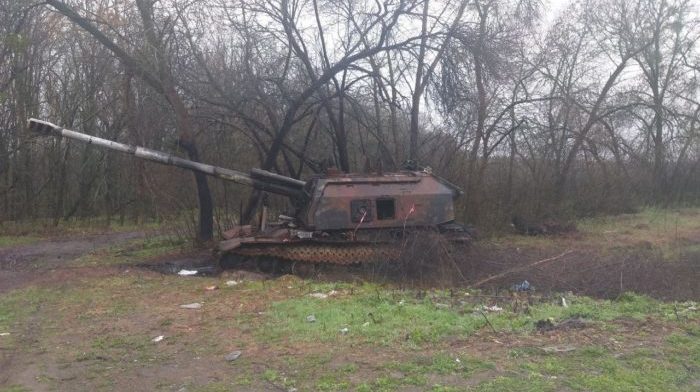
After some time, I decided to investigate the burned tank. What I saw overwhelmed me: there were two burned corpses of Russian soldiers. I even jumped aside from the surprise. The woman, noticing my shock explained to me what had happened. Ukrainian soldiers from the Territorial Defense Force had ambushed the Russians during the night and blew the tank up with a rocket-propelled grenade.
The women explained to me that the Russian soldiers that had occupied the village, did not even bother pulling their dead comrades out of the tank. They investigated what happened but told the locals: “it’s your problem now. If you want you can pull them out from the tank and bury them by the road.”
The locals only buried the third Russian because his corpse was catapulted out of the tank and landed in front of his would-be undertakers’ house. The rest were rotting in the tank since the end of March while children played outside. It appeared that the Russian soldiers were too busy doing much more important work like getting drunk and looting.
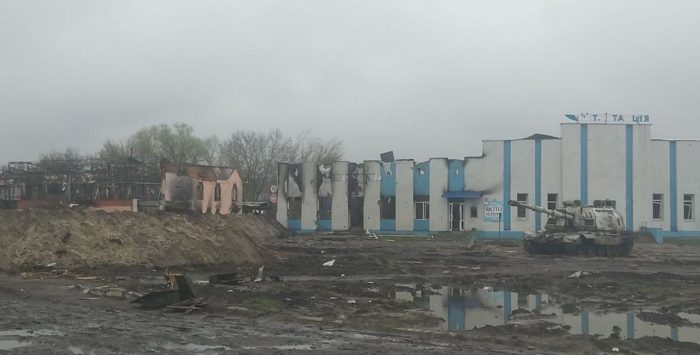
We entered Trostianets. The once beautiful square in front of the railway and bus stations had now been turned into a depressing scene of a battlefield with destroyed tanks and other military hardware scattered everywhere. Russians had dug huge trenches here to store ammunition while the railway station had been turned into the headquarters of the occupying force. Wooden crates are spread in some places; some are filled with earth. All around, color had been sucked out and replaced with soot, dirt, and abandoned Russian military equipment.
Next to another abandoned tank, we noticed two local women: Halyna and Valentyna. Still visibly traumatized and trembling, they told us about life in Trostianets under Russian occupation. After entering the city, soldiers immediately began looting shops. Valentyna said to us that the Russians behaved like barbarians not just towards locals but amongst themselves as they snatched bottles of whiskey from their comrades’ hands and took pictures with it as they did with Czech and German beer. They had joyfully sent pictures of booze to their relatives almost as if they had never seen such alcohol in their lives.
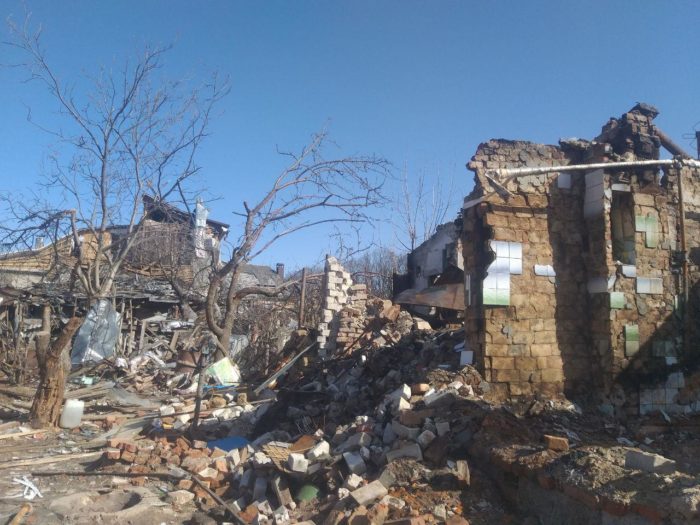
Halyna and Valentyna said that the same day looting began, drunk Russian soldiers grabbed one local man near the railway station and forced him to shout: “Glory to Russia!” He refused and shouted instead: “Glory to Ukraine!” at which point the Russian beat him and then forced him into the railway station. The man’s corpse was later found in the station with visible signs of torture.
After having looted the supermarkets, the Russians moved onto peoples’ homes. They justified entering peoples’ homes on the basis that they were alleged Ukrainian spies, but in reality – it was just another excuse to loot. They took as they pleased. The looting took place on such an industrial scale that when the Russian troops left Trostianets, a whole column of stolen trucks and cars carried goods stolen from Trostianets, moving along with their military equipment.
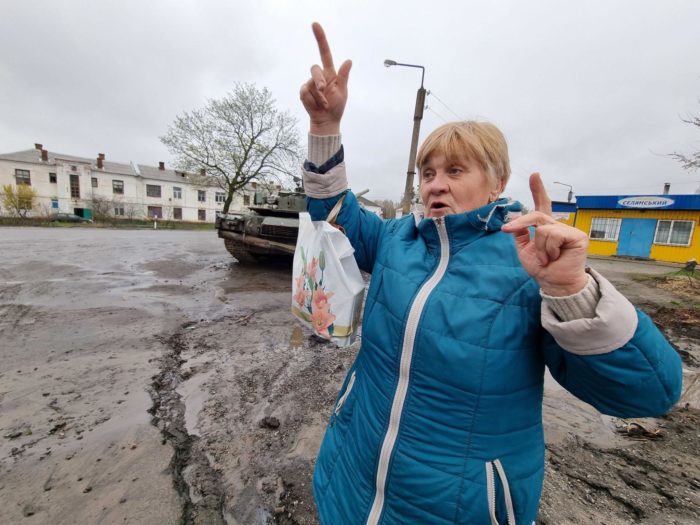
Halyna recalled how a unit of Russian soldiers visited her home. They saw a boiler in the bathroom which baffled them because as it turned out, they had never seen one before. Halyna tried to explain to them that the boiler was used for water heating, so you could wash dishes or take a shower using warm water.
The Russians could not believe that Halyna could afford to buy such a thing and began knocking down the boiler from the wall. They suspected it to be a special device installed by the Ukrainian army for data transfer purposes. Halyna begged them not to dismantle the boiler, otherwise, her house would be flooded. Nevertheless, the Russians did not listen and threatened to shoot her before removing the boiler.
Apart from looting household appliances from her home, the Russians stole all her underwear. Halyna could not understand why they needed an old woman’s underwear. If that was not enough for the Russian soldiers, one of them went into her bedroom and defecated on the floor.
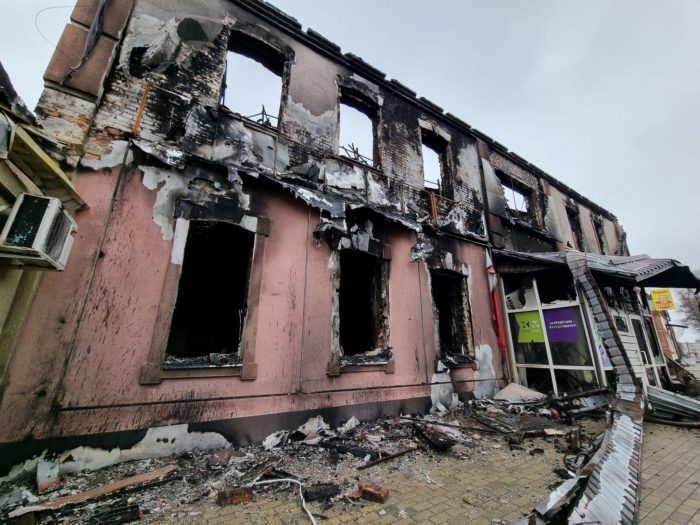
Valentyna told me how she saw Russian soldiers shooting at the local hospital. Without any military objective, whether for fun or out of pure hatred, the Russians fired 16 shells on the hospital from two tanks. They also set up a checkpoint near the hospital and did not allow doctors to come to work. The hospital itself now lies empty and ruined – the facade is damaged by debris, big airy holes instead of windows. A few years ago an expensive major repair was carried out on the hospital.
Halyna interrupted Valentyna and said that in the middle of March militants from the so-called Luhansk People's Republic and Donetsk People's Republic came to Trostianets. They actively joined other Russians in kidnapping and torturing the locals. They kept telling everyone how much they hated Ukraine. The militants claimed that for 8 years they had been “suffering” at the hands of Kyiv and now it was time for revenge.
Looting and senseless destruction was not the only gift that the Russian World had brought to Trostianets, Russian troops, and militants of the self-proclaimed Luhansk and Donetsk People’s Republics scattered mines all across Trostianets. Since the occupiers fled, at least four children were killed by the mines.
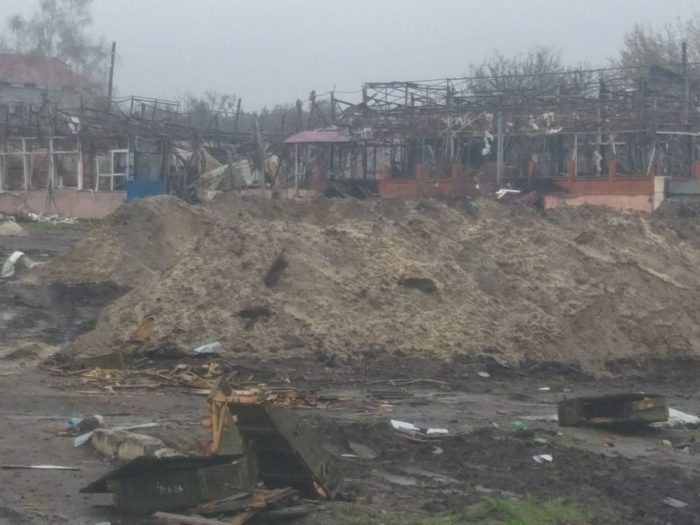
Valentyna and Halyna also recalled the many cases of torture they witnessed. Once, with the help of local collaborators, Russian soldiers found a former soldier of the Anti-Terrorist Operation in eastern Ukraine, Ukraine's resistance to Russian-led militants of the Russian proxy "republics" in Donbas. They ridiculed and humiliated him publicly before his tortured body was discovered in the pit nearby the railway station.
Finishing up our short visit to Trostianets, Valentyna recalled how she and her husband went to check on their friend Volodymyr, who lived in the multi-apartment house in the city center. They discovered him fighting a fire. For no apparent reason, two Russian armored personnel carriers had arrived and begun shooting at the building from their machine guns. Volodymyr was lucky to be on the first floor when the soldiers started shooting. The fire was started by machine-gun fire and the whole building was burned to the ground. Valentyna stutters through her tears: “I am afraid to live here.”
- He was a Putin fan. Then Russians bombed his house
- Russian attack on Ovruch: greenhouses bombed, death, devastation, and ruins all around.
- Russian war crimes in Katiuzhanka: torture chamber, toilets in classrooms, and stolen lingerie
- Cruelty, murder, and destruction in Bucha
- Russian occupiers in Makariv shelled the civilian shelter “in an instant” – Dispatch from Ukraine
- The Ukrainian Aleppo, or unprecedented terror in Borodianka – Dispatch from Ukraine
- She hid her daughters in the cellar for a month: how a village near Kyiv survived Russian occupation
- Ukrainian theology professor turned sniper tells how to hunt for Russian invaders

